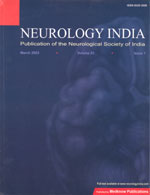
|
Neurology India
Medknow Publications on behalf of the Neurological Society of India
ISSN: 0028-3886 EISSN: 1998-4022
Vol. 53, Num. 2, 2005, pp. 195-196
|
Neurology India, Vol. 53, No. 2, April-June, 2005, pp. 195-196
Invited Comments
Invited Comment
Schoeman Johan, Donald Peter
Department of Paediatrics and Child Health, Faculty of Medical Sciences, University of Stellenbosch, Cape Town
Correspondence Address: Department of Paediatrics and Child Health,
Faculty of Medical Sciences, University of Stellenbosch, Cape Town, jfs@sun.ac.za
Code Number: ni05057
Related article: ni05056
In developing countries, childhood tuberculous meningitis (TBM) remains an important cause of neurological handicap and death. Current antituberculosis treatment is remarkably effective if administered timely; unfortunately, as in the present study, the diagnosis of childhood TBM is often delayed, resulting in severe neurological sequelae and even death.
Early diagnosis of TBM is notoriously difficult; the symptoms in stage 1 TBM are subtle, nonspecific, and relate more to the underlying primary infection (lung tuberculosis) than to the brain. Frequent diagnoses include gastroenteritis, otitis media, or upper respiratory infection. Poor weight gain, or loss of weight, reflected by crossing of weight centiles on the Road to Health Card, is an extremely valuable clue to early diagnosis.[1] In high prevalence tuberculosis areas, this should alert the clinician to the possibility of tuberculosis. A positive contact history, a chest radiograph and tuberculin skin testing are other most valuable simple procedures that may support an early tuberculosis diagnosis.[2]
Unfortunately, however, patients are often repeatedly seen without TBM being considered, resulting in disease progression to stages 2 and 3 TBM.[3] The majority of these patients will now have evidence of obstructive hydrocephalus on cranial computerized tomography (CT). Although noncommunicating hydrocephalus can result in serious neurological handicap and even sudden death due to cerebral herniation, if not recognized and managed appropriately, most cases of childhood tuberculous hydrocephalus are communicating and respond well to medical treatment (antituberculosis drugs and diuretics). Progressive tuberculous periarteritis, however, almost invariably results in infarction of the basal ganglia, the clinical correlates of which are focal abnormalities of power, tone, and/or abnormal movements. Brainstem microinfarcts, although rarely demonstrated by CT, are a common autopsy finding in advanced TBM and present clinically with deep coma and decerebration.
The present study prospectively assessed an impressive array of clinical features in a large cohort of childhood TBM patients with regard to the clinical outcome. These features were separately evaluated for neurological handicap and death by both univariate and multivariate analyses. A significant number of variables correlated independently with these outcomes with regard to prognosis. However, on multivariate analysis only hypertonia featured as a prognostic indicator for neurological handicap and only deep coma for death. We agree with the authors that these findings most likely relate to vasculitis and infarction since most patients in this study had stage 3 TBM.
The results of this study re-emphasize the need for early diagnosis of this devastating disease.
REFERENCES
| 1. | Donald PR, Schoeman JF, van Schalkwyk HJS. The "Road to Health Card" in Tuberculous Meningitis. J Trop Pediatr 1985; 31: 117-120. Back to cited text no. 1 |
| 2. | Donald PR, Schoeman JF, Cotton MF, van Zyl LE, Strachan G. Missed opportunities for the prevention and early diagnosis of tuberculous meningitis in children. S Afr J Epidemiol Infect 1990; 5: 76-78. Back to cited text no. 2 |
| 3. | Nuver J, Vloedbeld M, Schoeman JF, Gerritsen J, van der Palen J, van der Werf TS, Hoekstra MO. Factoren van belang voor vroege diagnose van tuberculeuze meningitis. Tijdschr Kindergeneesk 2001; 69: 9-13. Back to cited text no. 3 |
Copyright 2005 - Neurology India
|
